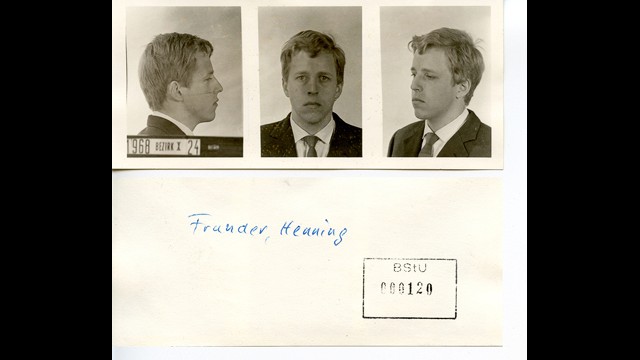The Stasi files: Germany's 600-million-piece puzzle
By Laura Goehler, CNN
November 7, 2014 -- Updated 1517 GMT (2317 HKT)
 Mugshots of Henning Frunder taken by the Stasi after his arrest.
Mugshots of Henning Frunder taken by the Stasi after his arrest.
Stasi files: History's biggest jigsaw puzzle?
STORY HIGHLIGHTS
- Henning Frunder was jailed in East Germany after his plans to leave came to attention of Stasi
Henning Frunder was only 21 years old in
1968 when he decided he wanted to leave Eastern Germany. Polish
fishermen were meant to take him and a group of students across the sea
to the Northern border of West Germany, but the group never made it on
that boat.
Letters to friends in the
West asking for money to pay for the journey ended up in the hands of
East Germany's secret police, the Stasi. A few weeks later, Frunder and
his friends were arrested, put on trial, and sent to jail for trying to
illegally leave East Germany.
Frunder spent months in a
Stasi prison before eventually being deported to Western Germany in the
fall of 1970. At that time he had no idea who sold him and his friends
out.
"We were not trained in conspiracy. Maybe we trusted more people than we should have with our plans," he says.
What was The Stasi?
The Ministery of State Security (Ministerium für Staatssicherheit,)
known as Stasi, was established in 1950 as the secret police and
intelligence service of the Socialist Unity Party of Germany (SED,) East
Germany's governing party. It followed the model of the Soviet secret
police and operated as part of the GDR's massive security apparatus.
The Stasi was known to have widely spied on citizens in Eastern Germany
and to persecute those that opposed and showed subversive behavior
against the Soviet-backed SED-Regime. It functioned as both a domestic
and foreign intelligence service. Before the Berlin Wall came down in
1989, the Stasi had more than 90,000 full-time employees and an even
higher number of secret informants.
What Frunder knew was that it must have been someone that they trusted, someone who pretended to be a friend.
For over 40 years Eastern
Germany's Ministry of State Security, known as the Stasi, spied on its
citizens, often using so-called "informal employees" -- secrets
informants -- to report on their own colleagues, friends and family.
When the Berlin Wall fell
in November 1989, Stasi agents were given the order to cover their
tracks and destroy any evidence that would reveal names of secret
informants, documentation of dealings with the West, protocols and
recordings of trial proceedings -- none of it was ever meant to be seen
by the public.
Activists were able to
stop the destruction when they occupied the Stasi headquarters in
January 1990. Over 45 Million pages of Stasi files had been torn apart
and what the shredder could not handle had been simply torn apart by
hand.
Over 15,000 bags
containing more 600 million pieces of paper were recovered. In 1992, two
years after the German reunification, the Agency for the Federal
Commission for the Stasi Records (
BStU) was put in place. Its task: Solve one of history's biggest puzzles.
Roland Jahn is the
Federal Commissioner in charge of the Stasi Records Agency. Jahn is an
ex-Stasi prisoner himself. He says the agency is doing an important job
in dealing with the past. "It is incredibly important for those
concerned to gain access to their files, people get a part of their
lives back that was stolen from them", stresses Jahn. He adds that the
agency providing access to secret police files is unique and serves as
an international role model.
So far 1.5 million
pieces have been put back together, most of them by hand. Currently
about a dozen employees are still manually trying to reconstruct the
files. With 600 million pieces left, continuing the task by hand seems
almost impossible.
How CNN reporter's dad fought the Stasi
"It is important that we
develop systems to speed up the process", says Jahn. In 2007 a computer
system was introduced to accelerate the process. According to the Stasi
Records Agency, the new virtual puzzle system has helped piece back
together four bags so far. To tackle the remaining 15,000 bags a "better
scanner technology has to be developed and put in place," says Jahn.
Decades after being sold out, Henning Frunder had thought he moved on. He didn't think he would ever find out who denounced him.
"Over time I stopped
wondering, I thought it would not change much", he recalls. In 1994 he
received first clues about who his betrayer might have been, but it was
not until 2011, over five decades later, that Frunder received a call
from the Stasi Records Agency. "Out of 15,000 bags they came across one
that had my name in it," he remembers. It was the file of
secret informant Aleksander Radler, a member of Frunder's student group.
Radler, nicknamed "Thomas," spied for the Stasi for over 25 years.
"When I learned that
Radler was living in Sweden, preaching the word of God as a priest, this
is when the outrage came," Frundler continues. But Frunder never
contacted the former spy. "He never showed any remorse, if he did, it
might be interesting to talk to him."
If you chose to live with a lie you damage our democracy. That's why it is important to uncover the truth, even if it hurts. (Stasi Records Agency Commissioner, Roland Jahn)
Even though the recovery
brought back old memories that Frunder thought to had been consigned to
the past, he still believes it is in the interest of society to
reconstruct the Stasi files.
"Looking back at my own
story, I think I was able to deal with it, because I was so young, I
hadn't built much they could take away from me. But he adds that "others
suffered more than we did and I am sure that there are many people out
there that have big blanks to fill, and recovering the Stasi files could
help bridging these gaps in the ordeal they went through."
Stasi Records Agency
Commissioner Roland Jahn sees the confrontation with the past as vital
for the future. "If you chose to live with a lie you damage our
democracy. That's why it is important to uncover the truth, even if it
hurts", he says.
Today, every citizen has
the right to request access to their files at the Stasi Records Agency
either online or in person. In over two decades more than three million
requests for files have been made, with more than 30,000 applications in
2014 alone.
If and when the
remaining 600 million pieces of Stasi files will be puzzled back
together, Jahn cannot tell. It will depend on available funds, public
and political interest and technology.
However, Jahn is proud
of what has been accomplished in the last 25 years. "Germany has shown
how to consistently face the past and deal with it, and being observed
by the international community, it has created something that is of
great importance today."







 The University of Edinburgh
The University of Edinburgh

 Mugshots of Henning Frunder taken by the Stasi after his arrest.
Mugshots of Henning Frunder taken by the Stasi after his arrest.




